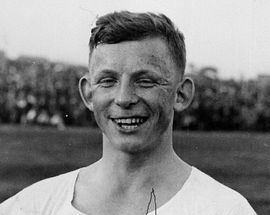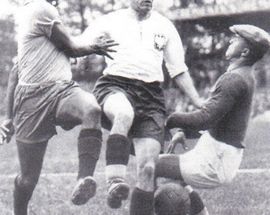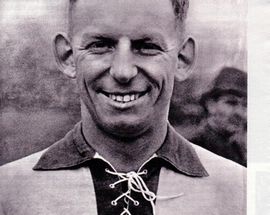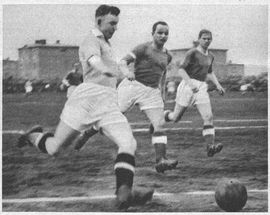Ernest Wilimowski - Silesia's legendary footballer
more than a year agoErnst was a footballing prodigy and is believed to have played in 1. FC Kattowitz's first team in the Polish top division at the age of 13. Wilimowski was transferred from 1. FC Kattowitz to Ruch Wielkie Hajduki (later Chorzów) for 1,000zł, the equivalent of 10 postmen’s salaries and two exhibition games. He was an extraordinary talent and became the first player to score 7, 8, 9 and 10 goals in a game. The 10 came against Union Touring Łódź (in the game when the famous Omega clock was unveiled at Ruch’s ground) and this still stands as a Polish league record today. He was league’s top scorer three times and claimed four Polish championships with Ruch at the end of the 30s. In total he scored 117 goals in 86 league games for Ruch. Most of them reportedly coming from a close range accompanied by a devilish smile.
Wilimowski’s international career was even more sensational. ‘Ezi’ known for liking of a drink didn’t go to the Olympic Games in Berlin 1936 but he was back for the World Cup in France in 1938. Poland met and lost to Brazil 5-6 after extra time in what was without a doubt most memorable game of the inter-war years. Wilimowski scored 4 as well as winning a penalty. In the last game before the outbreak of WWII, Poland beat World Cup runners-up Hungary 4-2 with Wilimowski scoring three and winning a penalty.
Just four days later the war began and an era ended. Wilimowski reappeared for 1. FC Kattowitz and swapped allegiance to play for the Nazi Germany national team.
Playing for Germany saw Ezi’s legacy destroyed and he was branded a traitor in post-war communist Poland. The six-toed forward remained in Germany after WWII and never returned to his beloved Silesia. A multi-talented sportsman he played ice hockey too while some football experts claim if the World Cup had been played in 1942, Wilimowski would have been remembered alongside the likes of Pele. Ezi’s story, while tragic, is not untypical for someone of his age growing up in Silesia in this period.
Altogether he scored 21 goals in 22 games for Poland, 13 for Germany in just 8 matches and there are claims he scored over 1000 in total in official matches although the exact number is highly doubtful as football was not that well documented in those days.
Wilimowski died in his adopted Karlsruhe in 1997 at the age of 81. In 2016 the Croat-Bosnian artist Milijenko Jergović wrote a book entitled ‘Wilimowski’ in which people listen to the 1938 World Cup match between Brazil and Poland game.
We'd like to thank our Polish football expert Maciej Slominski for his help as we put this together. You can find him on Twitter @MaciejSlominski.







Comments